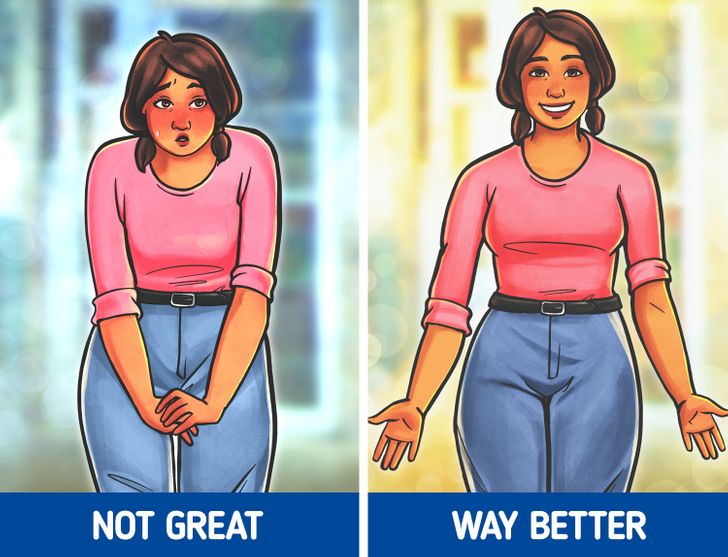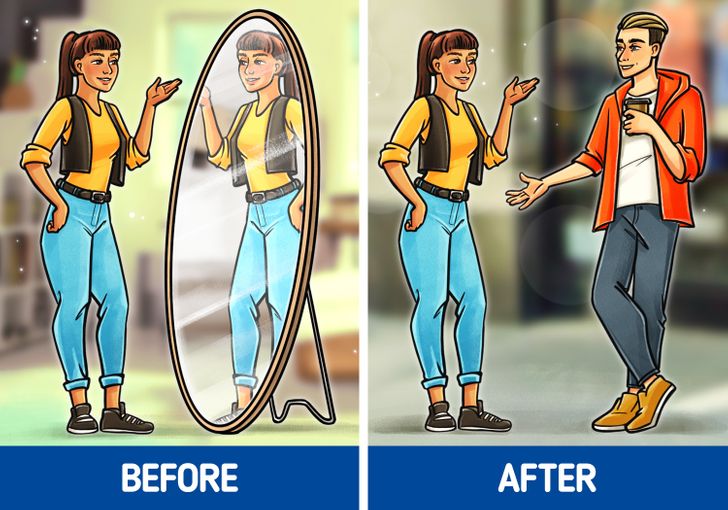8 Ways to Overcome Shyness

If when you walk into a room or public space and feel like everyone is looking at you and judging you, you find it difficult to talk to others, or you start sweating and can’t wait to leave, you’re probably a shy person. It happens to most people at one time or another. But when shyness keeps us from developing healthy relationships, it’s best to take action and do something about it.
5-Minute Crafts will show you some strategies that can help you gain confidence and overcome this behavior one step at a time.
1. Determine what makes you feel scared of others.

Before making a whole plan to overcome shyness, it’s essential to know what situations make you feel shy in the first place. Common examples of these types of situations include being alone at a party, having a job interview, or speaking in public during presentations. If you relate to any of these, it’s important to shift people’s attention to something else, like by asking them questions about themselves in order to get to know them better.
This is because you might have a negative self-image or you might be feeling self-conscious about something. That often leads you to think that others will be watching your every move and judging you. By diverting the conversation to other people’s interests, you might feel more comfortable and get rid of the feeling of being judged at the same time.
2. Change your posture to relieve your anxiety.

Sitting or standing with a straight back before and during events that can make you feel shy slows breathing and causes the brain to release neurotransmitters, which help relieve anxiety and increase our level of attention.
You can often tell someone is shy because of their posture. A shy person slouches by moving their shoulders closer to their ears while at the same time holding their breath without even realizing it. This posture actually sends a message of an immediate threat to the brain, so the entire nervous system goes on the defensive. On the other hand, straightening the back favors social performance, according to a study.
3. Develop a skill you’re passionate about.

Learn how to knit, take photography or painting classes, play a group sport, or do anything else you’re good at. Doing these things can help increase self-confidence.
A hobby that you’re clearly passionate about will also generate a commitment and encourage you to develop other skills that you may not be aware of, including social skills. Not only that, but you might also meet interesting people while partaking in these activities.
4. Interact with strangers bit by bit until you feel it’s natural to talk to others.

Go to a public place alone, such as a shopping mall, a restaurant, or a café. Sit down for a coffee or go to a store and engage in a brief conversation with the server or host. Make sure to make eye contact with the people around you and smile. This small exercise will allow you to relate to other people who cannot really evaluate you since they don’t know you.
This helps you open up and develop social skills without all the pressure that comes with interacting with people that already know your backstory. It can be difficult to leave your house with the goal of interacting with strangers, but it’s a good way to overcome shyness, little by little.
5. Practice different ways of speaking in front of the mirror.

Practicing different ways of speaking in front of the mirror, as if your reflection is someone else, allows you to see the gestures you make, how you stand, and when you start to ramble and sweat because you get too nervous. Once you’ve done that, it’s time to put your lessons into practice with a real person.
It’s recommended to use positive and motivational statements when conversing in front of your reflection. Try saying things like, “You can do it!” or “I know what I want and how to achieve it!” in addition to other similar sentences. A shy person may find it hard to strike up a conversation with someone else naturally, but rehearsing things ahead of time helps build self-confidence, according to psychologists.
6. Give sincere compliments to others.

When you want to start a conversation, it’s good to notice a detail that catches your attention in order to highlight it when speaking to someone. For example, make eye contact with the other person, smile, and say, “Your hair looks great today,” or “That blouse looks great on you.” Everyone loves receiving a compliment. From then on, let the conversation flow naturally.
Sincere and meaningful compliments not only make the person on the receiving end feel good, but it also makes the person saying it feel nice. Compliments generate positive energy and are a very useful tool for strengthening social relationships, as they provide an opportunity to make the first move. It’s not necessary to be condescending or overbearing, just be specific and honest.
7. Try to be kinder and more compassionate to yourself.

It’s advisable to think about the good things you have to offer and learn to highlight them every time you feel scared or anxious in front of others. Being kind to oneself helps you to cope with social situations much better. That’s because you will no longer punish yourself internally if you don’t manage to overcome your shyness in the first few attempts. In other words, it’ll help you cope with failure better.
People who suffer from shyness are usually very hard on themselves and end up thinking that others will be hard on them too. For that reason, it’s better to use this inner voice as an ally instead of an enemy.
8. Create a personalized support network.

This is essential to overcome shyness. You can always ask a friend to join you and be your support in stressful situations that trigger your shyness. They can even come to the rescue if things start getting weird when you leave your comfort zone.
Once you’ve identified what causes your social anxiety, as we mentioned in step 1, it’s a good idea to share your conclusions with someone close to you. Knowing that you have that type of support can help you gain confidence and finally overcome your shyness once and for all.